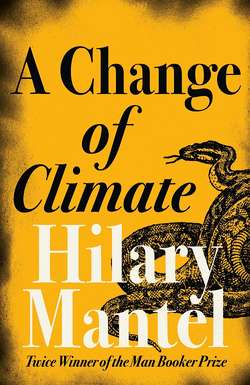Читать книгу A Change of Climate - Hilary Mantel - Страница 8
1970 SAD CASES, GOOD SOULS
ОглавлениеOne day when Kit was ten years old, a visitor cut her wrists in the kitchen. She was just beginning on this cold, difficult form of death when Kit came in to get a glass of milk.
The woman Joan was sixty years old, and wore a polyester dress from a charity shop. A housewifely type, she had chosen to drip her blood into the kitchen sink. When Kit touched her on the elbow, she threw down the knife on to the draining board and attempted with her good hand to cover Kit’s eyes.
By this stage in her life Kit was not much surprised by anything. As she ducked under the woman’s arm she thought, that’s our bread-knife, if you don’t mind; but she said, ‘You shouldn’t be doing that, Joan, why don’t you come away from the sink, why don’t you sit down on this chair and I’ll get the first-aid kit?’
The woman allowed herself to be led to a chair at the kitchen table. Kit pulled a clean tea-towel out of a drawer and wrapped it around Joan’s wrist. The towel was a checked one, red and white; Joan’s reluctant blood seeped black against the cloth. Her cuts were light, early, indecisive: the practice cuts. ‘Just wiggle your fingers,’ Kit said, ‘make sure you haven’t done any damage.’ The woman looked down at her hand in dry-eyed dread, while the child scrambled on a stool and brought down a box from a cupboard.
‘Lucky it’s half-term,’ Kit said, unpacking the bandages and the round-ended scissors. ‘Otherwise I wouldn’t have been here. I was upstairs. I was reading a book. It’s called Children of the New Forest. Have you read it? It’s about a family like ours, two boys and two girls, but they live a long time ago, in the olden days.’
I’m all fingers and thumbs, she thought. She heard her voice, running on. She was learning first aid at school. They told you, ‘Reassure the patient.’ ‘They live in the forest by themselves.’ Joan nodded: again her dumb dazed nod. ‘They’re Royalists. They have to hide from their enemies.’
Kit was afraid that Joan might faint, dropping as a dead weight to the flagstoned floor. ‘I’ll get you a glass of water,’ she said. ‘Or I dare say you could have hot sweet tea.’
She thought, poor Joan. Perhaps dead is what she wants to be. It’s just as Dad always says: you can never find a sharp knife when you need one.
As she stood filling the kettle, she heard her mother’s car. She knew the crunch and scrape and wheeze of it, as it lurched up the drive. Relief washed through her body, turned her legs to water. She put the kettle on the hob, and was wiping out the sink with disinfectant when her mother came in.
Anna put her bags down on the table. She saw, more in sorrow than in surprise, Joan’s figure slumped across it. ‘Tea for me as well, Kit,’ she said.
That night Kit caught the tail-end of a whispered conversation: ‘You didn’t say she was a suicide risk, Ralph.’
‘I didn’t say because I didn’t know.’ She closed her bedroom door; she didn’t want to listen to her parents’ private thoughts.
Three days later, she came into the kitchen and found her mother on her hands and knees by the sink, working on the flags with a scrubbing brush. ‘The blood’s gone,’ Kit said, puzzled. ‘I wiped it up.’
Anna didn’t answer her, but rose from the floor, lifted the bucket and threw the soapy water into the sink.
By this time Joan had left, taking everything she owned in the two carrier bags with which she had arrived. Sudden exits were not infrequent among their visitors; they were not like the visitors that other households get. Ralph made inquiries of the police, the Salvation Army, and the Department of Health and Social Security, but he drew a blank. When Anna came to check the first-aid kit – restocking it was one of her responsibilities – she noticed that Joan had taken an extra bandage with her. They saw this as a hopeful sign.
In those years, when the children were growing up, the house was full of people like Joan. Ralph brought some of them from the hostel in London, which was maintained by the charitable trust for which he worked. Others he took in when Social Services didn’t know what to do with them, or when there were no beds at the local psychiatric hospital. Sometimes they turned up of their own accord, crouching out of the wind in one of the outhouses until he came home. ‘So-and-so’s a sad case,’ he would say; and over the years, this was what the family came to call them: the Sad Cases. Other people he called Good Souls. ‘Your Aunt Emma is giving so-and-so a lift to her drugs clinic in Norwich – she’s a good soul.’
And this was how the world was divided, when Kit was growing up – into Good Souls and Sad Cases. There was no wickedness in it.
